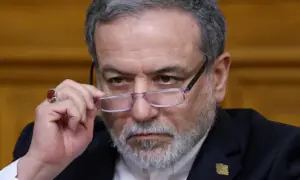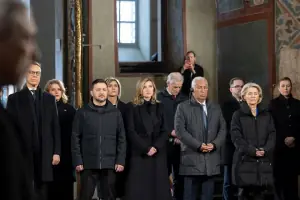United States faces tough questions on India-Middle East corridor
3 min readThe effectiveness and viability of the India-Middle East-Europe Economic Corridor was questioned during a press briefing of State Department Spokesperson Matthew Miller on Monday.
Responding to a question regarding the current trade route between Asia, the Middle East and Europe, he said that right now it is possible for ships to go from India to Saudi Arabia.
“It is possible. We believe it [corridor] will explore – the creation of a new shipping and rail transportation corridor,” he added.
Announced by the Indian prime minister and the European Union commissioner, the corridor was unveiled at the G20 summit as India portrayed it as another sign of a warming relationship between India and Saudi Arabia
However, an expert pointed out that a purported map being shown by the Indian media outlets was misleading and could not possibly contain an accurate depiction of the project.
Without giving further details, Miller said “this is the signing of a memorandum of understanding that is going to lead to the full implementation of this corridor. I don’t think I can speak to details before they have been fully established.”
He, however, downplayed its likely effects on the economy of Egypt and the Egyptian government’s reaction to such a project that could undermine the importance of its Suez Canal.
“We do not believe that this will in any way hurt Egypt. In fact, it will deliver positive economic benefits for the entire region,” Miller said.
For him, there was no replacement for the Suez Canal. “But I will note that there is a maximum throughput through the Suez Canal every day. And we do not believe that this economic corridor will in any way displace or replace the Suez Canal, and we believe ultimately it will deliver economic benefits for the entire region.”
The Suez Canal, which links the Red and Mediterranean Seas and connects Asia, Africa and Europe, is currently the major corridor with approximately 12% of global trade passing through it annually.
“I’m going to say, with respect to this agreement, this was the signing of a memorandum of understanding that will be fleshed out with further details and those details will be coming in further months, as they are fully implemented with the countries who signed onto the MOU,” the spokesperson said.
It is pertinent to mention that Turkish President Recep Tayyip Erdogan has also criticised the proposed project, saying that such an arrangement cannot work without involving his country.
Erdogan made the statement in front of journalists at the G20 conference where the India-Middle East corridor was announced.
“We say that there is no corridor without Turkey,” he said, adding that Turkey is an important production and trade base.
For the latest news, follow us on Twitter @Aaj_Urdu. We are also on Facebook, Instagram and YouTube.

























Comments are closed on this story.